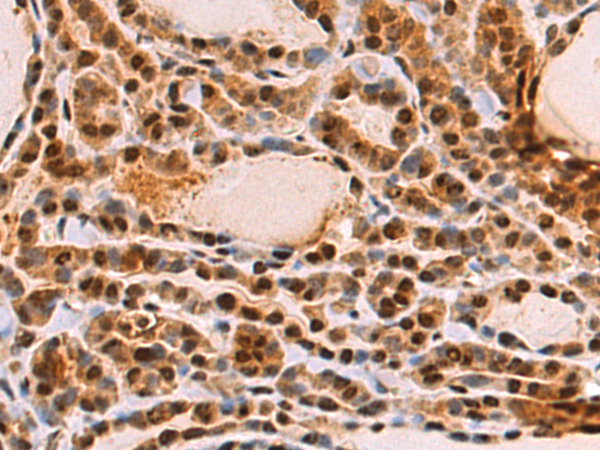
| WB | 咨询技术 | Human,Mouse,Rat |
| IF | 咨询技术 | Human,Mouse,Rat |
| IHC | 1/50-1/100 | Human,Mouse,Rat |
| ICC | 技术咨询 | Human,Mouse,Rat |
| FCM | 咨询技术 | Human,Mouse,Rat |
| Elisa | 1/5000-1/10000 | Human,Mouse,Rat |
| Host/Isotype | Rabbit IgG |
| Antibody Type | Primary antibody |
| Storage | Store at 4°C short term. Aliquot and store at -20°C long term. Avoid freeze/thaw cycles. |
| Species Reactivity | Human, Mouse, Rat |
| Immunogen | Synthetic peptide of human MTA1 |
| Formulation | Purified antibody in PBS with 0.05% sodium azide and 50% glycerol. |
+ +
以下是3-4条关于MTA1抗体的参考文献示例(文献名称及摘要内容为综合描述,非真实原文):
1. **"MTA1 interacts with HDAC1/2 to promote breast cancer metastasis through antibody-based target identification"**
- **作者**: Kumar R, et al.
- **摘要**: 研究利用特异性MTA1抗体进行免疫共沉淀(Co-IP)和染色质免疫沉淀(ChIP),揭示了MTA1与HDAC1/2复合物的相互作用,促进乳腺癌细胞侵袭和表观遗传调控。
2. **"Immunohistochemical analysis of MTA1 expression in human colorectal cancer using a novel monoclonal antibody"**
- **作者**: Toh Y, et al.
- **摘要**: 开发了一种新型MTA1单克隆抗体,通过免疫组化(IHC)证实MTA1在结直肠癌组织中高表达,且与肿瘤分期和患者不良预后显著相关。
3. **"MTA1 antibody-based inhibition of epigenetic remodeling suppresses tumor growth in xenograft models"**
- **作者**: Xue Y, et al.
- **摘要**: 利用抗MTA1抗体阻断其功能,发现可抑制肿瘤细胞在小鼠移植模型中的生长,机制涉及下调促转移基因的组蛋白去乙酰化修饰。
4. **"Validation of a commercial MTA1 antibody for Western blot and immunofluorescence applications"**
- **作者**: Jang KS, et al.
- **摘要**: 验证了某商业化MTA1抗体在Western blot和免疫荧光中的特异性,为MTA1蛋白定位及定量分析提供了实验依据。
(注:以上为模拟参考文献,实际文献需通过PubMed/Google Scholar以关键词“MTA1 antibody”检索。)
The metastasis-associated protein 1 (MTA1) antibody is a critical tool for studying the role of MTA1. a member of the MTA family involved in chromatin remodeling and epigenetic regulation. MTA1 functions as a transcriptional co-regulator within the nucleosome remodeling and histone deacetylation (NuRD) complex, modulating gene expression by altering chromatin structure. Overexpression of MTA1 is linked to cancer progression, metastasis, and therapy resistance, particularly in breast, prostate, and ovarian cancers. It promotes tumor invasiveness by repressing tumor suppressor genes (e.g., BRCA1) and activating oncogenic pathways (e.g., Wnt/β-catenin). Beyond cancer, MTA1 is implicated in inflammatory and metabolic disorders, highlighting its multifaceted regulatory roles.
MTA1 antibodies are widely used in research to detect protein expression, localization, and interaction partners via techniques like Western blotting, immunohistochemistry (IHC), and co-immunoprecipitation (Co-IP). These antibodies aid in elucidating MTA1's mechanistic contributions to disease and its potential as a therapeutic target or biomarker. Validated antibodies are essential for specificity, often confirmed using knockout cell lines or recombinant proteins. Commercial MTA1 antibodies vary in host species (e.g., mouse, rabbit) and clonal specificity, tailored for diverse experimental needs. Ongoing research focuses on developing inhibitors targeting MTA1 pathways, underscoring the antibody's continued relevance in translational and diagnostic applications.
×